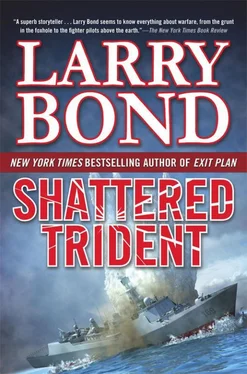In less than two days, they reported their findings. Both India and Vietnam had taken delivery of MDM-6 mines within the last three years. A quick review of Indian submarine operations eliminated them as the perpetrator—neither of their nuclear-powered submarines had left port for more than three days over the last several months. Their diesel submarines lacked the endurance to make such a long trip, and none were out of port for more than a week. The only other suspect, Vietnam, was exercising their newly purchased Kilo-class submarines often, and it was a very short trip from Nha Trang to Yalong Bay.
“General Wen, I agree the Vietnamese possess some knowledge of our plan,” replied Wei. “But their actions also reveal their belief that the absence of Liaoning will force us to abandon or postpone them. If we make any observable changes to the forces or schedule we’ve already released on the upcoming exercise, it will alert the Vietnamese that we are on to them. It’s very likely that there is a spy in our midst, who we must assume will see any changes in the units’ orders and report it. Other than increasing our security measures, I don’t think it is prudent to do anything.”
“Of course there is a spy!” snapped Su as he stood abruptly. “My security personnel are already conducting a thorough review of everyone who has had access to the campaign plan.” The general’s stern gaze made it clear that included everyone present.
Su paused, his head hanging low as he took a deep breath to calm himself. His colleagues just didn’t understand the source of his frustration. They didn’t see the larger threat.
“I am not particularly worried about Vietnam’s response to our impending military operation. They do not have the combat power to seriously challenge us. If they try, we can defeat them. Yes, we might sustain higher losses, but the final outcome is not in question. The greater issue, the more important question is, have they shared this information with any other nation? In particular, the United States.”
Only silence greeted General Su’s unpleasant question. If the United States knew of their plans, and chose to intervene, the outcome of the operation would not be in China’s favor. Every member of the CMC knew America was still militarily exhausted and economically weakened, but no one was willing to assume America would just sit idly by while China forcibly annexed the disputed islands. Their plan was to present the United States with a fait accompli , and then dare them to act.
President Chen finally broke the awkward quiet. “General, do you have any indications the Americans are aware of our plan?”
“No, sir,” he replied while stiffly shaking his head. “My intelligence department has been working closely with the Ministry of State Security’s Second Bureau, and there is no evidence at this time that the Americans have a clue as to what we are doing.”
“But you fear they will?” asked Wen.
“Yes, Minister, that is my greatest fear.” Su stood upright and straightened his uniform jacket. “Comrades, there is an old saying: ‘When two tigers fight, one is killed and one is crippled.’ If the United States joins the fight, it will not end well for us, even if we are victorious.”
General Wen smiled. He was an aficionado of ancient Chinese wisdom, and believed it was just as applicable in today’s high-tech world as it was centuries past.
“You were always the blunt one, Yide,” chuckled Wen. “However, your concerns are not without merit. What do you recommend?”
“Sir, if we no longer have stealth working in our favor, then speed is the next best thing. We must move before Vietnam has a chance to react. I recommend we advance our timetable by three weeks, and begin the invasion of phase one objectives on August 31st.”
“Three weeks!” protested Wang, astounded. “There is no way we can get the air defense platform in position and operational that soon. We were cutting it close to begin with.”
“I’m aware of this, General,” Su sympathized. “But it is my belief that the Vietnamese will use the platform’s departure as a warning indicator. They either know or at least suspect its purpose. They will be watching Guangzhou shipyard for any change in its status. The longer we delay its departure, the more relaxed our adversary will be. We have to make them believe they have been successful, that the operation has been postponed.”
Wang’s irritation was not soothed by Su’s explanation. “That platform is crucial to establishing an integrated air defense around Nanzai and Taiping Islands. Those islands have the largest airstrips in the entire Nansha chain and controlling that airspace is absolutely essential to our success!”
“There will be far less resistance if we don’t telegraph our intentions to the Vietnamese!” Su shot back. “The navy’s air-defense destroyers can temporarily fill the role of the platform. We can also fly in additional surface-to-air missile systems once the islands are secured.”
Wei reached over and placed his hand on the PLAAF commander’s shoulder. They weren’t going to win this argument, not with the minister of defense and the chief of staff in lockstep agreement. It was best to acknowledge the order and get to work on the changes needed to make the improvisations work.
Wen cleared his throat. “Comrade President, I recommend you approve Admiral Wei and General Wang’s changes, as well as General Su’s suggestion to advance the overall timetable.”
Chen answered formally, “Thank you, General Wen. The recommended changes are approved.”
Wen bowed politely, and turned toward his comrades. “I want all changes to the operational orders on my desk in two days. Do not make any large-scale unit movements. Do it in a piecemeal fashion. We must use extreme caution and deny the Vietnamese any signs that we are adapting to their strategy. Any final comments or questions?”
“Just one,” replied Su. “Keep the knowledge of these changes, as well as the recovered mine, to your immediate staff and your senior political commissars. No messages, no e-mails until further notice. I know this places an additional burden on you and your people, but we must protect this vital information. If you absolutely need someone to help with the planning, contact my office and we’ll get that individual cleared.”
“Anything else?” Wen asked. No one spoke. “Very well, gentlemen, you have your orders. Carry them out.”
19 August 2016
The White House
Washington, D.C.
Joanna Patterson leaned on the conference table in the situation room, her eyes darting back and forth from North Dakota ’s message to an annotated chart of the South China Sea. Her right hand groped along the desktop for her morning coffee. Finding the cup with her mocha latte, she took a sip as she read the next section of Commander Mitchell’s report. Commander Mitchell . She was still having a tough time wrapping her brain around that concept. Wasn’t he just a junior lieutenant only a few years ago? Now he was the commanding officer of his own submarine. Was she really that old?
She’d made the mistake of voicing this question to her husband soon after their return from Jerry’s change of command ceremony. His response was a completely deadpan and wholly unsympathetic, “Well, yeah.” She threw something at him, as she recalled.
Looking at the narrative, she tried to imagine being there as the Chinese sub got into position. The shock when Jerry realized that the Chinese had actually blown the Vietnamese merchant out of the water. This had to be tied to the Liaoning incident; there was really no other possibility. She shook her head; the timing of these events couldn’t be worse. A potential crisis with another superpower just as the president’s reelection campaign was struggling to fend off his Republican adversary’s attacks.
Читать дальше

![Никки Сикс - Героиновые дневники. Год из жизни павшей рок-звезды[The Heroin Diaries - A Year in the Life of a Shattered Rock Star]](/books/78612/nikki-siks-geroinovye-dnevniki-god-iz-zhizni-pavshej-rok-zvezdy-the-heroin-diaries-a-yea-thumb.webp)










